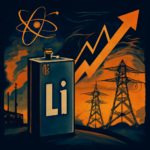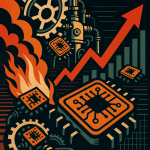“`html
Key Points
- The U.S. Department of Commerce launched a Section 232 investigation on July 1, 2025, into imported drones (无人机; wúrénjī) and their components, examining if they pose a threat to U.S. national security.
- A separate, ongoing Section 232 investigation is also targeting polysilicon (多晶硅; duōjīngguī) and its derivative products.
- These investigations determine if reliance on foreign imports weakens the U.S. economy to the point of threatening national security, with potential outcomes including tariffs or other restrictions.
- For drones, concerns include data security and supply chain reliance; for polysilicon, it’s about energy independence and vulnerability in critical infrastructure.
- If found to impair national security, the President has the authority to impose tariffs or other restrictions, impacting costs and supply chains in the drone and solar industries.

A new U.S. drone investigation is officially underway, and it could seriously shake up the global supply chain for some of the tech industry’s most critical components.
Here’s the breakdown of what’s happening and why it matters for anyone in tech, investing, or global trade.
The Lowdown: A Section 232 Investigation Kicks Off
On July 1, 2025, the U.S. Department of Commerce dropped a bombshell by launching a formal investigation into imported drones and their parts.
This isn’t just another trade dispute.
The investigation falls under Section 232 of the Trade Expansion Act of 1962, a powerful tool used to determine if imports are weakening the U.S. economy to the point that they pose a threat to national security.
Here are the key takeaways from the announcement:
- What’s Being Investigated: The U.S. is scrutinizing imported drones (无人机; wúrénjī) and all the components that go into making them.
- The Big Question: Do these imports threaten to impair U.S. national security?
- The Potential Outcome: If the answer is “yes,” the President of the United States has the authority to impose sweeping tariffs or other restrictions on these goods.
But wait, there’s more.
The Commerce Department also confirmed that a separate, ongoing Section 232 investigation is targeting polysilicon (多晶硅; duōjīngguī) and its derivative products.

Find Top Talent on China's Leading Networks
- Post Across China's Job Sites from $299 / role
- Qualified Applicant Bundles
- One Central Candidate Hub
Your First Job Post Use Checkout Code 'Fresh20'

Why This Matters: Breaking Down the “National Security” Angle
So, what exactly is a Section 232 investigation, and why is it such a big deal?
Think of it as the government’s lever for protecting industries considered essential for national defense and critical infrastructure.
If an investigation finds that the U.S. is too reliant on foreign countries for these goods, the president can act swiftly to protect domestic production—often through tariffs.
This goes way beyond simple economics; it’s about safeguarding the country’s ability to function independently.

ExpatInvest China
Grow Your RMB in China:
- Invest Your RMB Locally
- Buy & Sell Online in CN¥
- No Lock-In Periods
- English Service & Data
- Start with Only ¥1,000

The Two Imports Under the Microscope
- Drones (无人机; wúrénjī) and Their Components:
- Data Security: Potential for espionage or data siphoning from U.S. infrastructure.
- Supply Chain Reliance: Vulnerability from over-reliance on foreign imports if supply is disrupted.
- Polysilicon (多晶硅; duōjīngguī) and its Derivatives:
- Energy Independence: Vulnerability in U.S. energy grid if solar panel materials are foreign-sourced.
- Critical Infrastructure: Impact on the reliability and security of national energy infrastructure.
Let’s look at the two specific product categories being targeted and why they’re so important.
1. Drones (无人机; wúrénjī) and Their Components
Drones, or Unmanned Aircraft Systems (UAS), are everywhere. They’re used in everything from real estate photography and agriculture to infrastructure inspection and public safety.
The national security concern here is twofold:
- Data Security: Foreign-made drones, especially those with advanced sensors and connectivity, could potentially be used for espionage or to siphon sensitive data from U.S. infrastructure, companies, or government agencies.
- Supply Chain Reliance: An over-reliance on imported drones and components could leave critical U.S. operations vulnerable if that supply chain were ever disrupted.
2. Polysilicon (多晶硅; duōjīngguī) and its Derivatives
While the drone investigation is new, the polysilicon probe has been ongoing. This one hits a completely different, but equally critical, industry.
Polysilicon is the key raw material used to manufacture the vast majority of the world’s solar panels.
The national security argument here is tied to energy independence.
If the U.S. energy grid becomes increasingly reliant on solar power, and the solar panels themselves are made from foreign-sourced materials, it creates a potential vulnerability in a core piece of national infrastructure.

Resume Captain
Your AI Career Toolkit:
- AI Resume Optimization
- Custom Cover Letters
- LinkedIn Profile Boost
- Interview Question Prep
- Salary Negotiation Agent

What Happens Next? The Path to Potential Tariffs
- 1. Investigation: The Department of Commerce gathers information and public comments to assess the impact of imports on national security.
- 2. Determination: Commerce issues a report and recommendation to the President based on its findings.
- 3. Presidential Action: The President decides whether to impose tariffs, quotas, or other remedies if national security is deemed impaired.
This investigation is just the first step. Here’s a simplified look at the process:
- Investigation: The Department of Commerce will now gather information and public comments to assess the impact of these imports.
- Determination: Based on its findings, the Commerce Department will issue a report and recommendation to the President.
- Presidential Action: The President will then have the final say on whether to impose tariffs, quotas, or other remedies.
For founders, investors, and operators in the drone and solar industries, this is a critical development to watch.
Potential tariffs could significantly increase the cost of goods, disrupt established supply chains, and create new opportunities for domestic manufacturers.
The outcome of this U.S. drone investigation and the parallel polysilicon probe will have ripple effects across the tech landscape for years to come.

References & Further Reading
- Yicai (第一财经) Official Website
- U.S. Department of Commerce Seeks Public Comment on Risks Posed by Foreign-Made Drones – U.S. Department of Commerce
- Notice of Initiation of Section 232 Investigation of the Effect of Imports of Unmanned Aircraft Systems on U.S. National Security – Federal Register
“`





